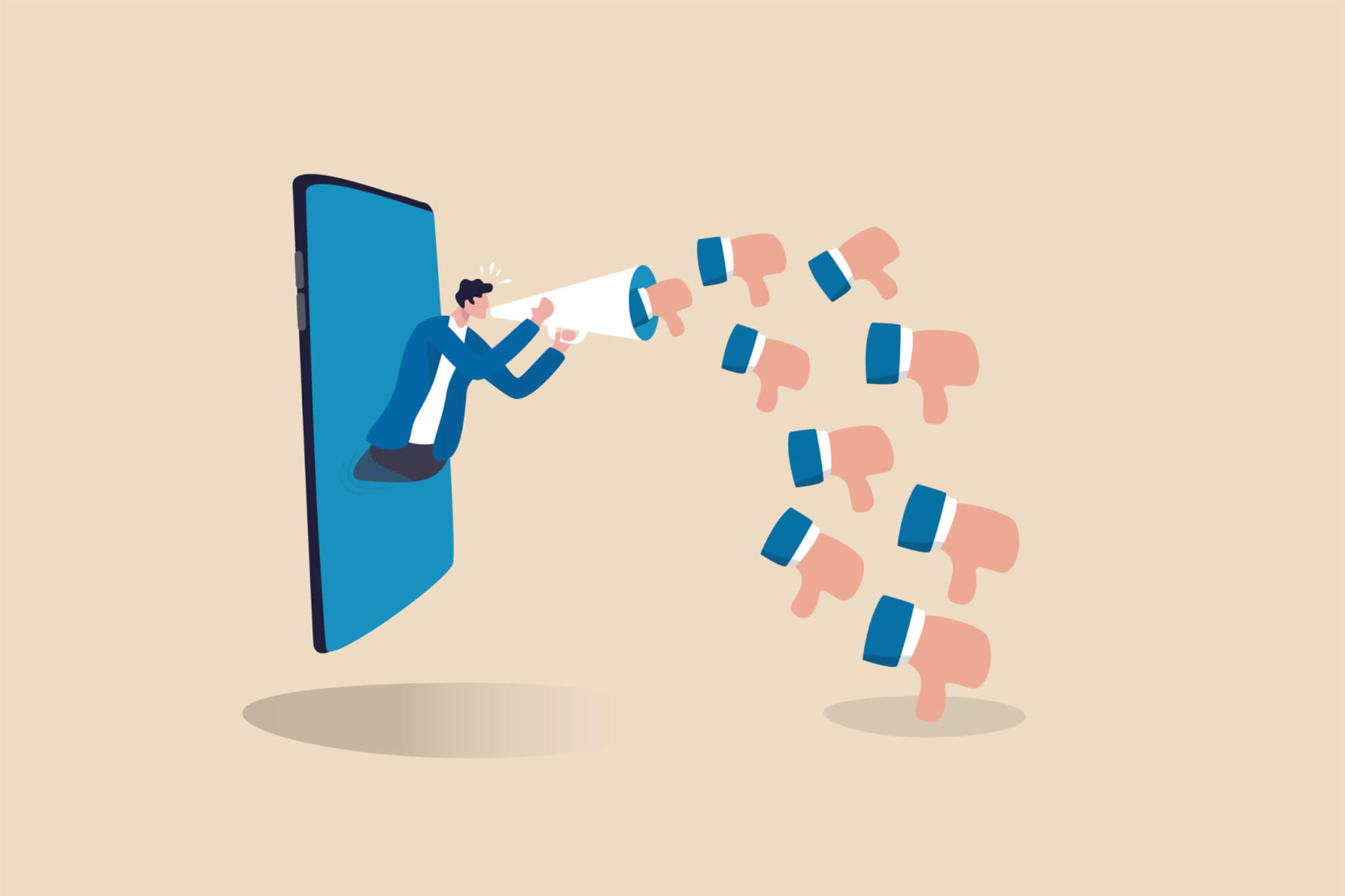“Outrage culture” is pervasive in the digital age. It refers to our collective tendency to react, often with intense negativity, to developments around us.
Usually, this ire is directed at perceived transgressions. The internet wasted no time in raging at Taylor Swift when she received Album of The Year at the Grammys, seemingly frustrated by her lack of acknowledgment of Celine Dion, who presented the award.
Whether or not Swift’s behavior could be considered rude isn’t the point. The point is the backlash arguably wasn’t proportionate to the crime. This so-called “snub” incident is, therefore, a good example of how quickly and easily people will jump on the online hate train.
Modern outrage culture, which is also known as call-out culture and is linked to cancel culture, often devolves into a toxic spiral. People wanting clout compete to produce the meanest and most over-the-top commentary, stifling open dialogue and demonizing those who make mistakes.

A tale as old as time
Collective outrage isn’t a new phenomenon – nor is it necessarily bad. Humans have adapted to become highly sensitive to the threat of social exclusion. Being called out hurts our feelings, which motivates us to change. We learn how this feels for us and we learn how to use it to influence others.
In pre-digital societies, expressing outrage to shame someone as a group served crucial social functions. It reinforced group norms, deterred potential rule-breakers, and fostered a sense of order and accountability within communities.
Expressing outrage can also challenge norms in a way that leads to positive societal change. The women’s liberation movement in the latter part of the 19th century is a good example of this.
The technological innovations of the internet, smartphones and social media have now enabled communal outrage on a global scale. Multiple societies can be affected at once, as witnessed with the #MeToo movement.
When outrage spirals
We’ve all seen it play out. Someone says or does something “controversial,” some posts draw attention to it and soon enough a whirlwind of comments appears, echoing over and over the person in question is fundamentally bad. The Johnny Depp and Amber Heard defamation trial is an example where, regardless of how you feel about the case, it’s hard to deny the discourse turned toxic. The collective moral outrage that drives such negativity spirals has parallels with people brandishing their pitchforks during the 1690s Salem witch trials. Sharing similar beliefs helps us feel like we’re part of the group.
Beyond that, the conviction we witness in others’ comments and behavior on an issue can stir up our own emotions, in what’s called “emotional contagion”. With our own emotions heightened and our convictions strengthened, we may feel compelled to join the choir of negative discourse.

The overall tone and style of language used by others can also influence how we act and feel. Social modeling dictates that if many others are piling on with negative comments, it can make it seem okay for us to do so, too. And the more exposed we are to one-sided discourse, the more likely we are to resist alternative viewpoints. This is called “groupthink”.
Social media algorithms are also generally set up to feed us more of what we’ve previously clicked on, which further contributes to the one-sidedness of our online experience. Scholars have suggested algorithms can prioritize certain posts in a way that shapes the overall nature of commentary, essentially fuelling the flames of negativity.
Two sides of speaking up
Unlike Salem in the late 1690s, today’s outrage culture is multiplied in intensity and scale due to changing cultural norms around “speaking up”. Combined with the anonymity and global reach afforded by the internet, the culture of speaking up has likely fuelled the kind of vocalization we see online.
For example, in the past two decades there has been growing societal recognition that it’s good to speak up against bullying. This can be associated with more education on bullying in schools. There’s also a growing trend of encouraging a speak-up culture in workplaces. So it’s not surprising many people now report feeling confident in voicing their opinions online.
It’s also easier to express negative opinions online since we can remain anonymous. We don’t directly witness the emotional pain inflicted upon our target. Nor do we have to worry about the potential threat to our personal safety that would be associated with saying the same horrible thing to a person’s face. As summed up by Taylor Swift herself in You Need to Calm Down: “Say it in the street, that’s a knock-out. But you say it in a tweet, that’s a cop-out.”
How can we combat negativity?
Navigating the pitfalls of outrage culture requires us to adopt a more reflective approach before participating in public condemnation. Consider also that outrage culture runs counter to the moral ideals most of us admire, such as:
- everyone makes mistakes
- people are worth more than their worst actions
- people are capable of growth and change, and deserve second chances
- it’s okay to have different opinions to others
- the punishment should fit the crime.
Research suggests positive comments can be a productive counter-influence on negativity spirals. So it’s worth speaking up if you do witness matters getting out of hand online. Before clicking the send button, consider asking yourself:
- do I really believe what I’m about to say or am I going along with the group?
- how might this comment affect the person receiving it, and am I okay with that?
- would I communicate like this if it was a face-to-face situation?
By encouraging reflection, empathy and open dialogue, we can avoid toxic outrage culture – and instead use our collective outrage as a force for positive change.
Article by Shane Rogers, Lecturer in Psychology, Edith Cowan University
![]()
This article is republished from The Conversation under a Creative Commons license. Read the original article.





Had to stop reading this only because of the unending ads picturing a dude wearing some damn thing on his feet. Stop it!!!!!
WAAAAAAAAHHMBULANCE Dispatched !
The topics spoiled, materialistic westerners are angry about are moot compared to those living (and dying) in war-torn and/or third-world countries.
Grow up and be thankful for what you have and where you live.
We are all humbled by your observation, and acknowledge your moral superiority to us spoiled, decadent Westerners. Thank you for spreading your enlightenment to the benighted commoners of capitalistic countries who are denied the spiritual benefits of third-world Nature. And thank you for illustrating the article so aptly!
You make me so angry !!!
Well stated. We have a dumbed down, selfish, cowardly, immature stupid society. Glad I’ve never posted a single word nor will I ever.
The joy in not participating with morons provides for an excellent nights slumber, zero personal stress, zero necessity to have idiotic, profitless conversations and many other benefits too numerous to list.
You are glad you never posted a single word?
Opps, looks like you just made your first post! Sleep well!
Thanks to the women’s movement. Now it’s time to put them back in the kitchen
Sometimes I actually long for the days prior to the world of the internet when I was blissfully sheltered from the fact that there are legions of utterly stupid people out there.
A few hundred people expressing anger …out of 300 million, is hardly “outrage culture consuming society”. What is really happening is the media making a big issue out of nothing. Controversy sells.
There’s the crux. Media hype.
It’s just the collective boiling over the garbage being pushed upon it by Hollywood, DC, and the media.
When we’ve finally had enough, we’re coming for blood and scalps. This is just the run up.
Sadly, this is true…and even more sad and horrifying is that it may take a horrible man made catastrophe, such as a major war, to shake these blithering idiots, of all persuasion, back to sanity. In the last twenty years society has come to believe the most raised noise and civil destruction will solve the problems. Well, we can see how well that is working. In America, strong leadership will be necessary to quell the loose demons. God forbid it take a thermo-nuclear war with thousands dead and unbearable destruction to bring our once great and proud nation out of its current societal insanity. Where are the teachings of the Good Book when so desperately needed…
I never feel angry or irate when I’m online. Of course, I only use the internet to look at naked girls.
I’m with Emory. Why is this news? (I am digitally outraged.)
The outrage club is a big one and typically promulgated by insecure millennials and other low experience people. Elon Musk is a prime example. There was an article recently where it showed a picture of him wearing a cowboy hat and apparently it was on backward. This insults were immediate and accused him of being a “phony” person. This tickled me. Here’s a man who created Tesla and SpaceX, sent rockets that linked to the space shuttle and is one of the great pioneers of our age, and yet the insignificant little outrage ants (who’s claim to fame is how quickly they can build a burrito at Taco Bell) actually have the sack to criticize him. Classic!
You youngters and to me. that’s anyone under 60 better figure out real quick that politics are no more deserving of your attention than oh say Christmas. Life, your family and soon grandkids should be taking up 99% ofyour attention because in the end, and by the way, there is one, they are all that matter. In every other Nov, read the issues, pick your candidate and accept the results because trust me, there is nothing else you can do.
Who are you to say backlash wasn’t appropriate? It’s not your job and Taylor Swift song may have started all this. She sang that song, “calm down “. She’s yelling at me to calm down when I was already calm. Your generation is the seed and the proliferation of entitlement that produces the fruit of being offended every second of your loathing life. Why don’t you get a life?
Municipal code enforcement, “your neighbor reported you”.
All I can think is, “why not talk to me directly instead of turning me in to government”. I am not going to turnabout and report every last neighbor. True, every last one of them one has at least one code violation. But, none are bothering me. If one did, I’d speak to my neighbor.
What percentage of people are on SSRI’s or Other Mood Altering substances ?
Yes, there is a toxic outrage culture in America today. However, the biggest perpetrators of this toxic culture is our treasonous American media! The liberal media in America has already completely betrayed the American people politically. Now the media actually enjoys turning Americans against one another in hatred!
Good post. The media profits according to the chaos they foment. More chaos, more profit. How much chaos is to be had before society disintegrates may be discovered soon. Where will the media then spend their riches?
I love all of you.
“… positive societal change. The women’s liberation movement in the latter part of the 19th century is a good example of this.”
and that was when society went for a total meltdown. The most negative societal change since we stopped killing 50% of ‘girl-children” at birth.
The greatest reason for the Roman legions, the barbaric hordes, the Crusades, the British Empire and two world wars was to get out the house, go a long way away, just to not have to hear them any longer. Now they want to take that from us by having females in the army.
Do you understand why Saint Paul said “I suffer not a woman to teach, nor to usurp authority over the man, but to be in silence”?
Women in politics has destroyed the world, women in business has destroyed business and commerce, women in the media, even with their clothes half on, has destroyed communication.
Social “outrage” is a females way of handling things. Men would go and punch someone in the face and the problem is solved. Women gossip, insult and form gangs to be mean and bullying of those they want to hurt because they are jealous. Bullying was never a major problem with boys 40-50 years ago, it was sorted out physically. Since girls have pushed themselves to the front, bullying is no longer physical and the damage is ten times as great. I never heard of a single kid committing suicide 60 years ago, now it is a major cause of teenage death.
Put the women and girls back in their place and the problem is solved.